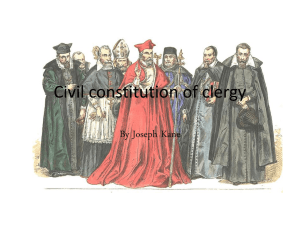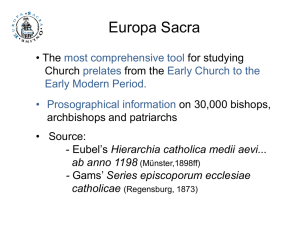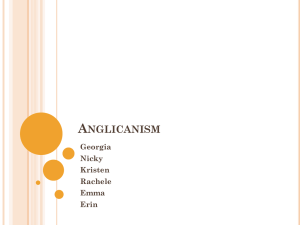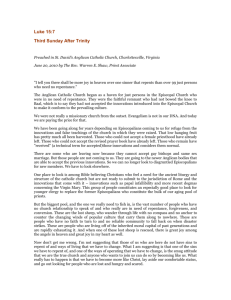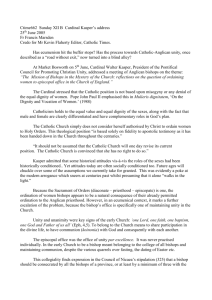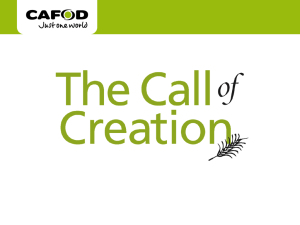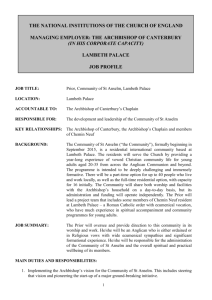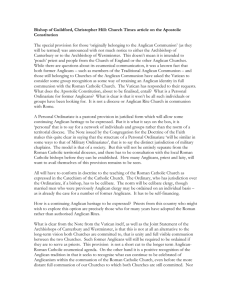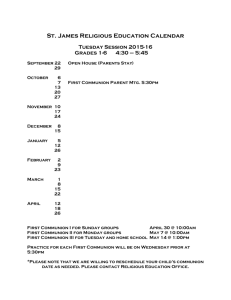the anglican communion & the episcopal church
advertisement
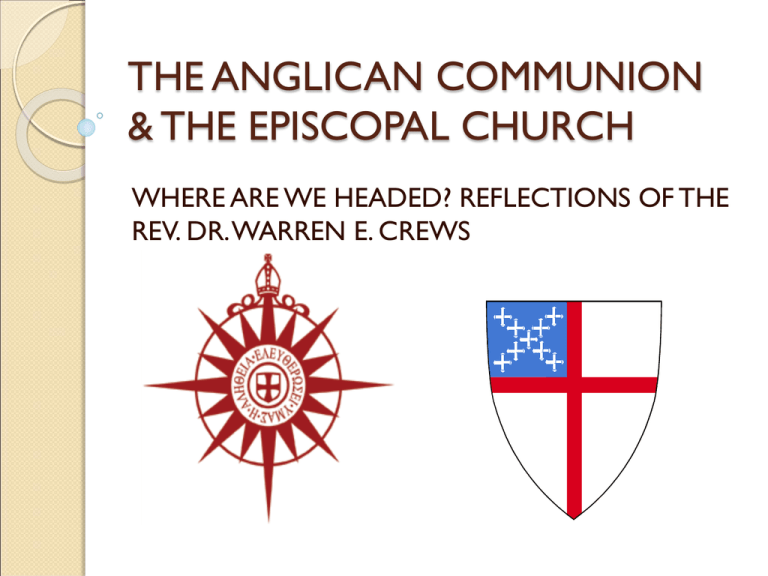
THE ANGLICAN COMMUNION & THE EPISCOPAL CHURCH WHERE ARE WE HEADED? REFLECTIONS OF THE REV. DR. WARREN E. CREWS COMPOSITION OF THE ANGLICAN COMMUNION Africa Asia Central & S. America Europe N. America Pacific Total 34,725,000 4,533,000 162,000 26,566,000 3,935,000 4,630,000 76,650,000 HISTORY OF THE ANGLICAN COMMUNION In the beginning there were the Church of England (incl. churches in the colonies), the Church of Ireland, & the Scottish Episcopalians—all in communion with each other through the Archbishop of Canterbury. After the American Revolution, we formed the Episcopal Church in such a way as to remain in full communion with the Archbishop of Canterbury. HISTORY OF THE ANGLICAN COMMUNION Soon the British gave the C of E mission churches limited autonomy as provinces. In 1863 controversy erupted in South Africa over new methods of interpreting the Bible. The British government intervened. The Canadian bishops asked the Abp. of Canterbury to call a meeting of all bishops of the Anglican Communion to consult on this & other matters. [This term first used in 1851.] HISTORY OF THE ANGLICAN COMMUNION Archbishop Longley rejected the idea of an international body with judicial powers, but instead called all the bishops to come to Lambeth Palace to confer on issues of concern. In 1867 the first Lambeth Conference gathered in London, and has met roughly every ten years since then. HISTORY OF THE ANGLICAN COMMUNION Most famous gathering was 1888 when it developed the “Lambeth Quadrilateral” to guide Anglicans in ecumenical negotiations: ◦ Scripture as the rule & ultimate standard of the faith & containing everything necessary for salvation ◦ Apostles’ & Nicene Creed as sufficient statement of the Christian faith ◦ Baptism & Supper of the Lord ◦ Historic Episcopate locally adapted HISTORY OF THE ANGLICAN COMMUNION That first meeting did not solve the issues in S. Africa: ◦ the conservative evangelicals withdrew & formed their own separate Anglican church with bishops provided by the Diocese of Sydney; ◦ they have never been recognized as part of the Anglican Communionby the Abp. of Canterbury, who has always been the judge of who is part of the Anglican Communion. STRUCTURE OF THE ANGLICAN COMMUNION After the British shed most of their colonies beginning in 1940s, Anglicanism exploded in growth. The Lambeth Conferences recognized the need for a more a more developed structure in addition to the Archbishop of Canterbury & the Lambeth Conference to deal with “issues”: ◦ An Anglican Consultative Council (1968) ◦ A Primates Council (1978) STRUCTURE OF THE ANGLICAN COMMUNION Anglican Consultative Council includes a bishop, a priest or deacon, and a lay person from each of the 38 Anglican provinces, meets every three years, has a constitution, which was then ratified by all the provinces—this is the only document voted on by clergy and laity, & voted in 2005 to include primates in the ACC, but this has not been ratified by the provinces. STRUCTURE OF THE ANGLICAN COMMUNION The Primates, as the highest ranking bishop of each of the 38 provinces (archbishop or presiding bishop):. have met every year since 1979, are a council of advice to Archbishop of Canterbury, & since 1998 have sought to take on greater authority to settle disputes & to discipline those provinces not responding to their directives. THE ISSUES Part of the motive behind the formation of the ACC was the growing concern about division over the ordination of women. In 1970 the ACC narrowly approved the ordination of women. After the United States began to ordain women in 1977 the 1978 Lambeth Conference ruled that each province was free to move ahead on this, & in 1988 asked that everyone’s decision should be respected. THE ISSUES In 1978 & again in 1988 Lambeth Conference affirmed traditional view of marriage, but called for a dispassionate study of new research on homosexuality & how to provide pastoral care for this group. At Lambeth 1998 a large group of bishops (200) hammered out a balanced position, but it was overruled and a resolution simply condemning homosexuality as immoral was substituted. (I.10) RECENT DEVELOPMENTS In 2003 the Primates asked General Convention not to confirm the election of Gene Robinson as Bp. of New Hampshire. Many of them felt that the Presiding Bishop misled/betrayed them when the Convention did confirm him. The Archbishop then set up a Lambeth Commission, which produced the Windsor Report, which the Primates & the ACC adopted. RECENT DEVELOPMENTS The Windsor Report asked for: ◦ an American & Canadian apology for acting contrary to I.10 without consultation within the Communion, ◦ a moratorium on consents to gay consecrations & same-sex blessing rites, ◦ those who consecrated Robinson to absent themselves from Anglican gatherings such as the upcoming ACC meeting, ◦ Americans & Canadians to explain their rationale for such consecrations & blessings, & RECENT DEVELOPMENTS ◦ the development of an Anglican Covenant to outline the basic theological principles that unite Anglicans; to develop a Communion structure that could rule on whether a particular concept or practice is consonant with the Covenant; & to require subscription to the Covenant for membership within the Communion. ◦ Abp. Williams suggested that those accepting it would be the “constituent” members, those who do not would only be “associate” members. RESPONSES TO THE WINDSOR REPORT The American delegation at the ACC meeting at Nottingham presented a defense, but that was not persuasive to many in the “Global South.” In 2005 the House of Bishops covenanted among themselves not to consent to the election of any bishop until the General Convention of 2006. No bishops in a samerelationship were confirmed at the Convention (because none were elected). RESPONSES TO THE WINDSOR REPORT The General Convention of 2006 voted: ◦ to participate in the development of a covenant that would help preserve the unity of the Anglican Communion, ◦ to request that bishops & standing committees do their best not to consent to the election of anyone whose life-style is offensive to the rest of the Communion (B033), & RESPONSES TO THE WINDSOR REPORT ◦ to remind the Communion that we have not authorized any public rites of blessings of same-sex relationships, but that private pastoral care of gay persons is legitimate (including blessings). ◦ GC elected Katherine Jefferts-Shori as PB, a supporter in the past of gay blessings & ordinations. RECENT DEVELOPMENTS Following GC 2006 several dioceses asked Canterbury for “alternative primatial oversight” [visitations, consecrations, discipline] due to PB Jefferts-Shori’s views. Global South bishops have begun consecrating American bishops as members of their provinces, but for service in the USA with congregations that have withdrawn from ECUSA. That has led to a flurry of lawsuits. RECENT DEVELOPMENTS The Primates met in February 2007 in Dar es Salaam, Tanzania to receive a report from the a special committee chaired by Rowan Williams ◦ that said that in their opinion General Convention 2006 had adequately responded to the Windsor report, but that some further clarifications were necessary; ◦ this was rejected by the majority of the primates. RECENT DEVELOPMENTS The Primates voted to: ◦ ask the American bishops to accept a Primatial Vicar system that would be put into place by a special primates’ council; & ◦ ask the American bishops to state clearly that they will not consent to any more gay bishops or to same-sex blessing rituals, and to do so by September 30th. RECENT DEVELOPMENTS The House of Bishops met in March 2007 to respond to the Tanzania Communiqué: ◦ rejected the Primatial Vicar system as contrary to our constitution and canons & a step towards internationalization; ◦ said that re B-033 only General Convention can interpret it; & ◦ did not act on the issues of consents and blessings. RECENT DEVELOPMENTS ◦ was generally negative concerning the proposed covenant in the Communiqué, especially its enforcement mechanisms, which put ultimate authority in the primates; & ◦ asked Canterbury & the Primates’ & ACC’s standing committees to join the HOB’s September meeting. RECENT DEVELOPMENTS Over the summer the consecrations by outside bishops intensified (Nigeria, Uganda, Kenya, Rwanda). Several dioceses have begun to remove any reference to the Episcopal Church in their constitutions (Fort Worth, Pittsburgh, Quincy, San Jaquin, others to follow). Several retired bishops have joined the African groups; several have become Roman Catholics. RECENT DEVELOPMENTS The House of Bishops met in New Orleans September 20-25 together with Abp. Williams & primates. They voted: ◦ to reaffirm our strong desire to remain as constituent members of the Communion, ◦ to accept the PB’s plan to delegate her primatial responsibilities to conservative bishops for any diocese requesting alternative oversight, RECENT DEVELOPMENTS to reaffirm B033 to exercise great restraint in consecrating anyone whose life style is offensive to the rest of the Communion, to promise not to authorize public, official blessing rites (did not outlaw private, pastoral blessings), & to reaffirm our commitment to the full inclusion of gay & lesbian persons in the life of our Church RECENT DEVELOPMENTS Immediate reactions to New Orleans Communiqué: ◦ liberal bishops can live with it, but will continue their current practices. ◦ moderates feel progress has been made, but will push for separate recognition if the Communiqué is found inadequate. RECENT DEVELOPMENTS ◦ Very conservative bishops & key African primates immediately rejected it because: no stated repentance & acceptance of Lambeth I.10 no agreement to ban all blessings no iron-clad agreement to prohibit new gay consecrations. refusal to accept Tanzania primatial vicar plan. RECENT DEVELOPMENTS 51 bishops from 13 groups that comprise Common Cause met in Pittsburgh under the leadership of Bp. Duncan from September 25-28. They voted to: ◦ organize themselves as a college of bishops which will meet every 6 months ◦ promise to work together at local & regional levels, & to achieve clergy interchangeability. RECENT DEVELOPMENTS Follow a timeline of 15 months to call a “founding constitutional convention” for a new Anglican province in North America in consultation with supportive Anglican primates Meanwhile they will have to figure out what to do with 51 bishops for 600 congregations. They also will have to determine worship standards & what to do about the ordination of women. Finally, they have to prepare for major court battles for the 5 Episcopal dioceses involved. RECENT DEVELOPMENTS On October 3rd the majority of both the Standing Committees of the Anglican Consultative Council & of the Primates gave their response to the New Orleans Communiqué: ◦ that our Bishops’ response to the Primates’ two questions of clarification is adequate, ◦ that the PB’s proposed primatial vicar system & offer to consult with the Communion about them is adequate, & ◦ that “foreign interventions” by primates stop. RECENT DEVELOPMENTS The African primates met on Oct. 5th: ◦ Asked for a special meeting of the primates to: evaluate the sufficiency of the American response to the Windsor Report; To complete the Anglican Covenant to be submitted to the provinces for ratification; For Lambeth Conference 2008 to be postponed until ratification is completed; Only those accepting the Covenant be invited. THE FUTURE??? Having received the report from the joint standing committees who were in New Orleans, Abp. Williams will confer with the primates by telephone before issuing his own judgment of whether we adequately responded to the Primate’s recent Communiqué’s request for clarification regarding our response to the Windsor Report. Respond to the African bishops’ demands. THE FUTURE??? Options open for the Archbishop: ◦ Declare that we have sufficiently complied with the Windsor Report to remain invited to Lambeth 2008. Significant portion of the African bishops would then boycott it. ◦ Withdraw our invitations because of insufficient response. Smaller numbers of bishops who disagree with that might boycott. ◦ Postpone Lambeth until 2010 and proceed ahead with developing the Covenant & make its acceptance a prerequisite for attendance. THE FUTURE??? My guesses: ◦ The Abp. will go with the first option, following his previous judgment & having spoken against postponement. ◦ The conservative African primates will not officially break, but will proceed ahead with a new province & with the threat to form an alternative Anglican Communion based on doctrinal agreement rather than on Canterbury. THE FUTURE??? Lambeth 2008 will produce some sort of Covenant that we may not be able to sign. Abp. Williams would then attempt to institute the constituent & associate membership categories down to individual bishops, which would could create havoc in many places with many dioceses & parishes wanting oversight by alternative primates or bishops. This proposal will not fly with most provinces. THE FUTURE??? Good chance that no compromise will work & we will end up with two Anglican Communions roughly the same size: One centered around the Archbishop of Canterbury & more loosely structured around autonomous provinces One centered in Africa & more tightly structured with the primates being a final authority on any controversial matter.
